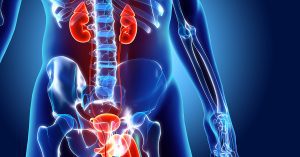 About 37 million American adults have chronic kidney disease, often called by its initials, CKD. With so many people dealing with the condition, a lot of people ask: is there a cure for chronic kidney disease? To correctly answer that question, we need to look at what CKD really is and what causes it.
About 37 million American adults have chronic kidney disease, often called by its initials, CKD. With so many people dealing with the condition, a lot of people ask: is there a cure for chronic kidney disease? To correctly answer that question, we need to look at what CKD really is and what causes it.
What is CKD?
Chronic kidney disease, or CKD, is a condition in which there is lasting damage to the kidneys that leads to a gradual loss of kidney function. Your kidneys function as filters for your body by removing wastes and excess fluid from your bloodstream. The waste products and fluid are then excreted in your urine. When your kidneys are damaged, they become less effective at filtering and the wastes and fluids build up in your body, causing complications.
Two-thirds of CKD cases are caused by either diabetes or hypertension (high blood pressure). Both type 1 and type 2 diabetes can cause kidney damage because of the high levels of glucose in the blood of a diabetic individual. Glucose damages the filtration units over time, leading to chronic kidney disease, and even kidney failure.
Hypertension and CKD are very closely linked. High blood pressure can cause damage to blood vessels in the kidneys, but chronic kidney disease can also cause high blood pressure if it was not already present. So, if you have one of the two conditions, you need to be on the lookout for the other. Kidney disease also increases your risk of later developing heart and blood vessel disease.
Other conditions that affect kidney health and can lead to CKD include:
- Glomerulonephritis – a group of diseases that cause inflammation and damage in the kidneys
- Polycystic kidney disease
- Interstitial nephritis
- Chronic or recurrent kidney infection (pyelonephritis)
- Malformations during fetal development
- Lupus and other diseases affecting the immune system
- Obstructive problems, such as kidney stones, tumors, or enlarged prostate
Certain groups of people are also at a higher risk of developing CKD, such as those with diabetes, hypertension, or cardiovascular disease. Other at-risk groups include seniors (over 60 years old), smokers, those who are obese, African Americans, American Indians, Hispanics, and Pacific Islanders. Having a family history of kidney disease can also increase your risk.
Symptoms of CKD
In the early stages of chronic kidney disease, you may not experience any symptoms. By the time you notice symptoms your kidneys may have already suffered significant damage. If you notice any of the symptoms below, you should see your doctor:
- Fatigue or decreased energy
- Poor appetite
- Nausea and vomiting
- Shortness of breath
- Difficulty concentrating
- Trouble sleeping
- Frequent urination, especially at night
- Muscle cramping during the night
- Swollen feet and ankles
- Dry, itchy skin
- Puffy eyes in the morning
To diagnose CKD, your doctor will perform blood tests to determine your eGFR, or estimated glomerular filtration rate, which measures how well your kidneys are filtering waste from your blood. Urine tests for blood protein and blood pressure testing are also used to diagnose chronic kidney disease.
Is There a Cure for Kidney Disease?
While the underlying causes of chronic kidney disease can be treated and sometimes cured or corrected, chronic kidney disease itself does not have a cure. CKD means there is lasting damage, and that can’t really be reversed. The progression of the damage can be slowed or even stopped, but the damage will remain in some form. However, there are ways to treat and manage chronic kidney disease that can improve one’s quality of life with the disease.
Treating Chronic Kidney Disease
To treat chronic kidney disease, you need to treat the cause of the problem. When the cause is identified, then the doctor can prescribe treatments specific to the issue. When diabetes or high blood pressure is the cause, then managing those conditions is critical to the treatment of your CKD.
The goal of CKD treatment is to control symptoms, reduce complications, stop or slow the progression of the disease, and improve the quality of life. Medications may be given for high blood pressure, high cholesterol, swelling, and anemia.
If chronic kidney disease progresses and becomes end-stage renal disease (ESRD), you may require dialysis. Dialysis is a process in which blood is filtered through a special device to artificially remove the waste products and fluid. Kidney transplants are also sometimes an option for those with ESRD.
Make an Appointment
At Durham Nephrology we have been caring for patients dealing with kidney disease and high blood pressure for over 25 years. If you have concerns about chronic kidney disease, whether you have already been diagnosed or are at risk, call 919-477-3005 to make an appointment at our Durham office or 919-690-1035 to make an appointment at our Oxford office. You can also request an appointment online.
